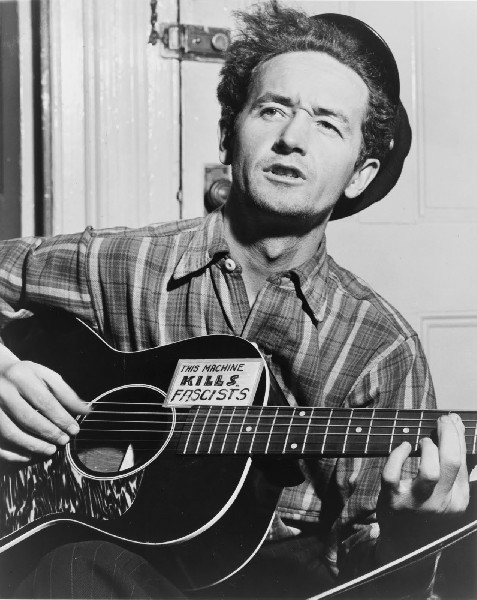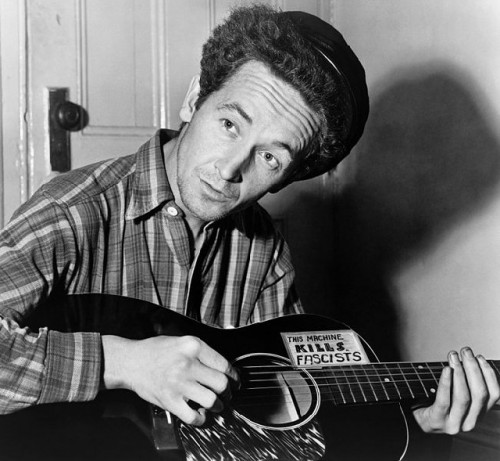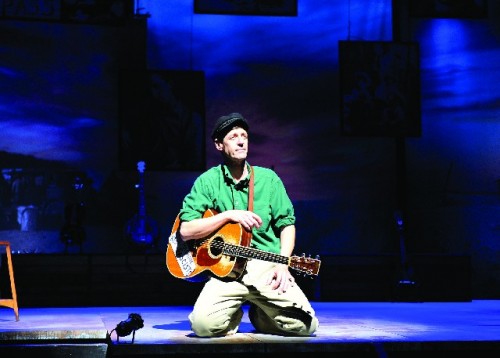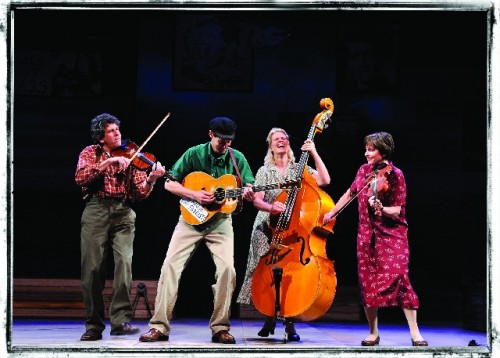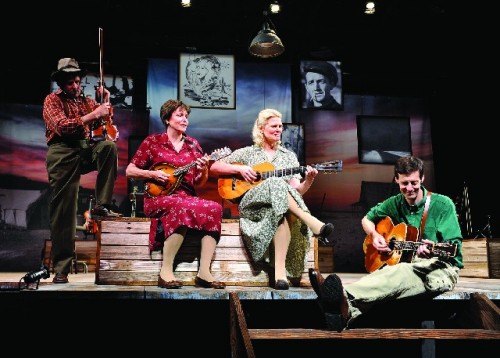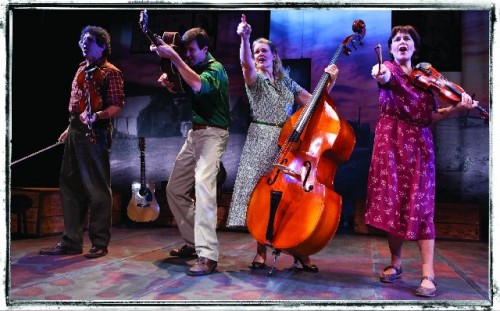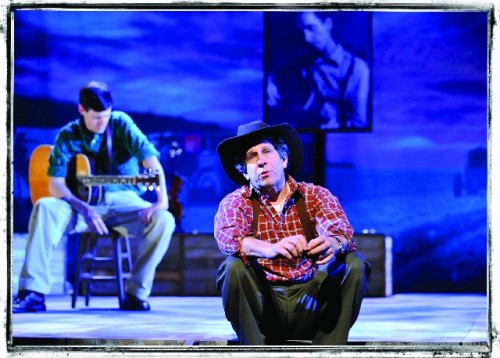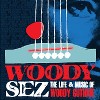Woody Sez Sings at American Repertory Theatre
Resonating Musical History of Iconic Folk Singer
By: Mark Favermann - May 10, 2012
Woody Sez: The Life and Music of Woody Guthrie
Devised By David M. Lutken and Nick Corley
Directed By Nick Corley
Performed By David M. Lutken, Darcie Deaville, Helen Jean Russell and Andy Teirstein
Scenic Design By Luke Hegel-Cantrella
Costume Design By Jeffrey Meek
Lighting Design By Matt Frey
At Loeb Drama Center, 64 Brattle Street, Cambridge, MA
The American Repertory Theatre
Folk music is the melody of the people. It has many unequal but provocative parts: historic tradition, cultural insight, political activism, passionate protest and poetic romance. Woody Guthrie (1912-1967) is one of the giants of American Folk Music.
He was both a music interpreter as well as a chronicler. In his considerable song output, the past was fused with the present and the hope of the future. Gutherie always expressed his notion of right and wrong.
Celebrating the 100th anniversary of Woody Guthrie's birth, Woody Sez currently playing at the American Repertory Theatre in Cambridge's Harvard Square is a wonderful straightforward musical history of the life and good as well as bad times of Guthrie.
Woody Sez is a biography as well as a story about a particular time and specific places in America. Guthrie was a protest folksong writer and performer. With limited formal education, he not only expressed himself by music, but he also wrote books, essays, articles, poems and observations.
Remembered primarily for his music, his lyrics and tunes have a universal resonance. Throughout the show, the audience is moved to grinning uncontrollably, handclapping, toe-tapping and sing-alongs. It is a show for all ages.
The importance of Woody's politics is interspersed throughout. He was a man of thoughtful social justice and an unbridled sense of fairness. His ideas, writings and philosophy eventually got him censored by NBC Radio and literally Blacklisted in the late '40s and early '50s. This comes out in Lutkens' portrayal and the emphasis and flow of the hero's story.
Guthrie's primetime was from the mid-1930s through the 1940s. His legacy mirrored the social and economic problems of that period of Depression and War. The show tells the story of a tough Oklahoma upbring, his mentally ill mother, and various family tragedies.
A theme or perhaps metaphorical circumstance was the danger of fire. Two family homes and a sister were consumed by fires set by his ill mother. His mother died in an institution for the insane. She actually was diagnosed with Huntington's Disease, the genetic, dishabilitating illness that took Guthrie's own abilities and eventually caused his early death. However, this sadness is offset by the passion and humanity of the music.
The production starts off very low-key, rather slowly in fact, and continues to build through the 90 minutes of high spirited performances and often poignant narrative.
Most of the spoken part of the show is by David Lutken who quite seamlessly morphs Woody Guthrie himself. Playing various roles, the three other performers (Darcie Deaville, Helen Jean Russell and Andy Teirstein) are all multii-instrument virtuosos.
This was a portrayal of countrified American music rooted in Appalachia with branches in the Southwest. The variety of instruments played is marvelous including various guitars, fiddles, harmonicas, viola, autoharp, Appalachian dulcimer, double bass, mandolin, banjo, pennywhistle, jawharp and soup spoons. Yes, soup spoons!
Beginning with This Train Is Bound for Glory and ending with This Land Is Your Land, twenty-eight of Woody Guthrie's songs are performed over the course of the show. Woody Sez is a songbook of this iconic musician.
Many of the show's songs resonate today. So Long It's Been Good To Know Yuh, Union Maid, Riding In My Car and Jolly Banker seem to be as fresh and passionate as when they were first composed.
The production is elegantly and rather minimally staged by Luke Hegel-Cantrella with images of the 1930s and '40s as backdrop with wooden crates as furniture and structures. The lighting by Matt Frey enhances the visual emotion and moody atmosphere of the themes, time period and subject matter.
Those of us of a certain age are particularly touched by Guthrie and this show. Bob Dylan, a devoted fan of Guthrie's, reintroduced the folksinger in the early 1960s. Many other folksingers followed Dylan. This led to a revival of folk music that predated and paralleled the Beatles. It is a part of babyboomer cultural history.
With his sharp wit, clear point of view and ironic humor, Woody Guthrie is Mark Twainesque with a bit of fellow Oklahoman Will Rogers. Lutkens portrays a nuanced man of the people, simple yet complex, charming and determined, passionate and compassionate. All things to be admired especially with wonderful music.
With much art and little artifice, like the main character, Woody Sez conveys a lot of wisdom and charm. It is a lovely, thoughtful show to be heartily experienced and enjoyed.
The American Repertory Theater (A.R.T.) is also hosting a number of post-show hootenannies after selected shows led by cast members and other local artists. Members of the audience are invited to bring their own instruments and join in a free-form musical celebration in the Loeb Drama Center’s West Lobby and Patio, following various performances.

